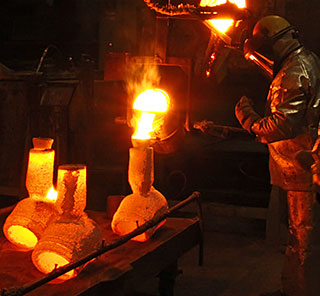Brass and Bronze Castings
Brass and Bronze alloys generally have good strength and good hardness. These alloys generally have excellent resistance to corrosion and good resistance to fatigue and wear.
| Alloy Properties | |
|---|---|
| Representative Alloys | Brass- C83600, C87500; Bronze- C90300, C90700, C95200, C95400, C95500, C95800 |
| Applications | Brasses are typically used for general corrosion resistance and where moderate material strength is required. Bronze alloys offer product usage up to 750°F, excellent corrosion resistance against seawater and other water applications while maintaining high material strength. |
| Limitations | Brass alloys cannot be hardened or strengthened by heat treatment while bronze alloys generally can be temper-annealed for enhanced corrosion resistance. |
| Typical Uses | Valve parts, gears, propellers, impellers, pump parts, Naval and saltwater applications, marine uses. |
| Machinability | Most brass grades are readily machinable using standard tooling and techniques. Bronze grades, being stronger in general in comparison to brass, require higher cutting angles and rates but are still readily machinable. |
| Weldability | Generally very good with most grades of bronze and some brasses. |
| Corrosion Resistance | Extremely corrosion resistant to seawater, brackish water, and freshwater applications. In general, good corrosion resistance for most applications. |

